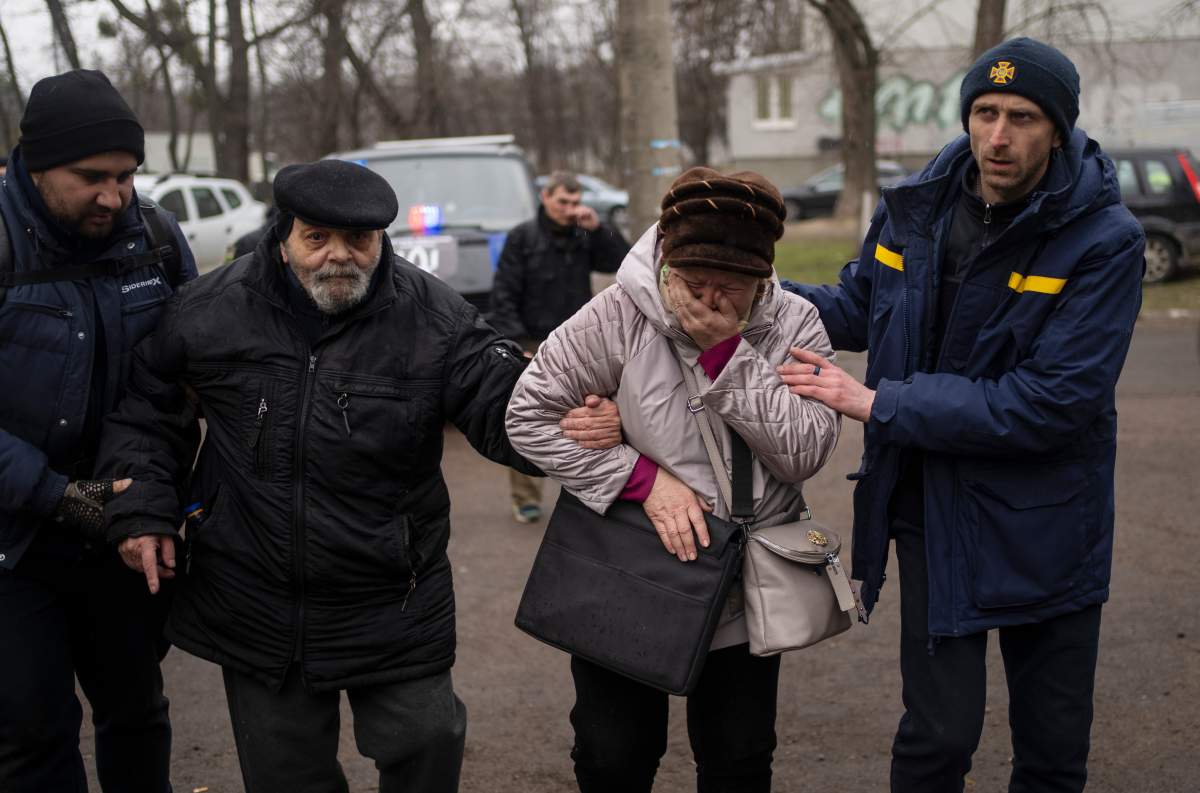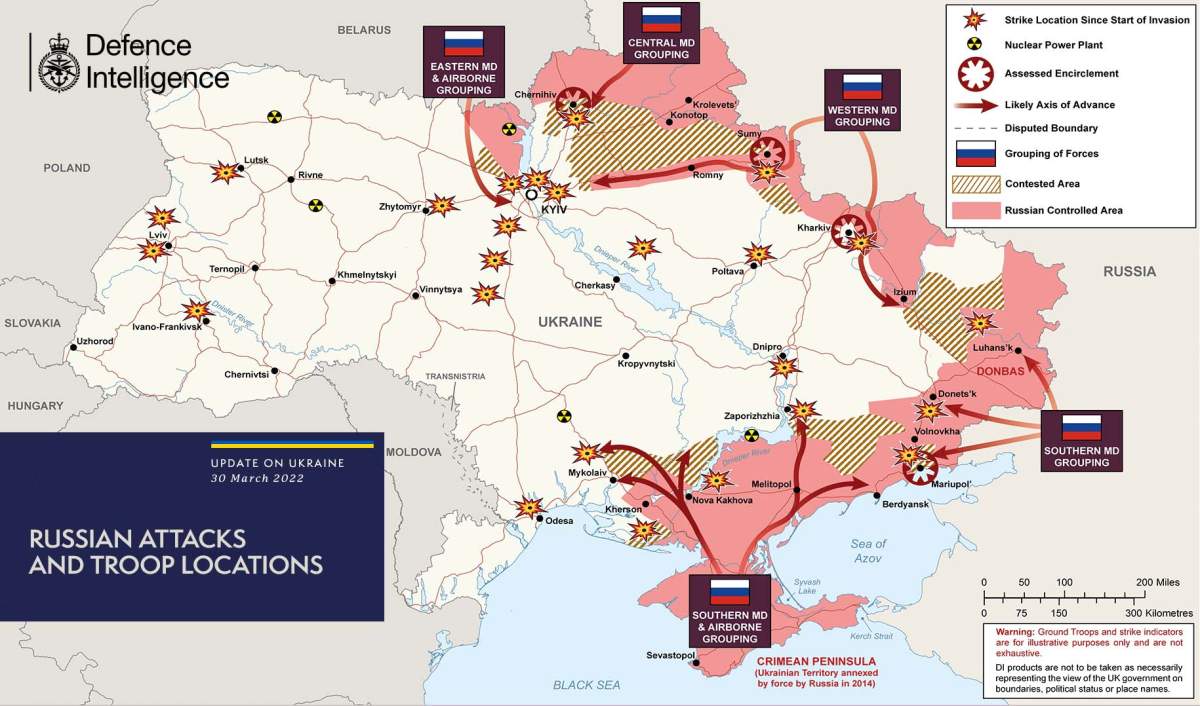The Kremlin poured cold water on the outcome of peace talks with Ukraine on Wednesday, saying there were no breakthroughs at the meeting in Turkey.

Tuesday’s talks in Istanbul were the most significant to date, Turkey’s foreign ministry said. Ukrainian negotiators proposed accepting neutral status and floated Canada as a potential security guarantor under an agreement.
Russia said it would drastically cut its military activity focused on Kyiv and Chernihiv, and would review the proposals. The Kremlin’s spokesperson addressed the outcome of the talks on Wednesday.
Here’s a round-up of what’s happening.
No breakthrough in peace talks, Kremlin says
While acknowledging it was a “positive factor” that Ukraine submitted written proposals, Kremlin spokesman Dmitry Peskov said there doesn’t appear to be an immediate path to peace.
“We can’t say there has been something promising or any breakthroughs,” he said in a call with reporters, emphasizing there is still a lot of work ahead following the talks.
Peskov said Russia’s chief negotiator, Vladimir Medinsky, has reported Ukraine’s proposals to President Vladimir Putin.
In an overnight address, Ukraine President Volodymyr Zelenskyy said he took nothing Moscow said at the talks at face value.
“Ukrainians are not naive people,” he said. “Ukrainians have already learned during these 34 days of invasion, and over the past eight years of the war in Donbas, that the only thing they can trust is a concrete result.”
Top negotiators offer insight
Later on Wednesday, Medinsky said Ukraine indicated in writing it was willing to give up its ambition of joining NATO, adopt “non-bloc” status, renounce nuclear and other weapons of mass destruction and commit not to host foreign troops or military bases on its soil.
He added Ukraine had agreed not to conduct military exercises with foreign armies except by agreement with state guarantors, including Russia.

Get daily National news
“This is the essence, meaning and importance of the document preliminarily agreed upon at a … high level by Ukraine. However, work continues, negotiations continue,” he said on Russian TV.
However, Medinsky added Moscow’s position on the Donbas region and annexed Crimea remained unchanged, and that is a major sticking point for Ukraine, which said it will not make any concessions on its territorial integrity.
Ukrainian negotiator Mykhailo Podolyak said on Wednesday he felt optimistic after the talks with Russia in Istanbul.
He said a proposed system of security guarantees for Ukraine, which would be offered in exchange for its neutrality, would be put to a national referendum only after Russian troops withdrew to positions they held before the Feb. 24 invasion.
West must sanction Russia further while peace talks ongoing: official
While the two sides work to hammer out a deal, a top Ukrainian official is urging western allies for more support as the conflict rages on.
In a Facebook post, Dmytro Kuleba said international sanctions must be cranked up and Ukraine must be further armed.

“The logic is extremely simple – the stronger Ukraine is, the better any future deal will be,” he said.
Britain on Wednesday introduced new legal powers to prohibit maintenance on aircraft and ships belonging to sanctioned Russian oligarchs or their businesses, and EU sources told Reuters the bloc was preparing new sanctions against the Kremlin.
Shelling continues around Kyiv, officials say
A day after promising to scale back its operations around Kyiv and northern Ukraine, officials said Russia continued shelling around the capital on Wednesday.
Over the past 24 hours, there were 30 Russian shellings of residential areas and civilian infrastructure in regions around Kyiv, said Oleksandr Pavliuk, the head of the Kyiv region military administration.
In Chernihiv, the other area where Russia had promised to scale back its operations, the bombardment only intensified over the past day, said Mayor Vladyslav Astroshenko.
“This is yet another confirmation that Russia always lies,” he told CNN in an interview. “They actually have increased the intensity of strikes,” with “a colossal mortar attack in the centre of Chernihiv.”
Russia’s defence ministry later said its forces were regrouping near Kyiv and Chernihiv to focus on other key areas and complete the “liberation” of the breakaway Donbas region, Russian news agencies reported.
Russia redeploys some forces to eastern Ukraine, official says
While the fighting continues, an adviser to Ukraine’s president said Russia has redeployed some of its forces to the country’s east.
Moscow has moved its troops to try to encircle the Ukrainian forces there, said Oleksiy Arestovych, adding Russia left some of its forces near Kyiv to tie up Ukrainian troops trying to advance in the region.

Meanwhile, Ukrainian Defence Ministry spokesperson Oleksandr Motuzyanyk said Russia is regrouping and preparing for renewed offensive operations.
He said Russia was still trying to take the southern port city of Mariupol, and the towns of Popasna and Rubizhne. Motuzyanyk added Ukraine’s armed forces command had observed some movements of Russian forces away from the Kyiv and Chernihiv regions, but did not consider it to be a mass withdrawal.
— with files from The Associated Press and Reuters.










Comments